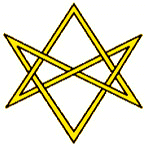...Best of Sicily presents... Best of Sicily Magazine. ... Dedicated to Sicilian art, culture, history, people, places and all things Sicilian. |
by Vincenzo Salerno | ||
Magazine Index Best of Sicily Arts & Culture Fashion Food & Wine History & Society About Us Travel Faqs Contact Map of Sicily |
Crowley was self-admittedly bisexual, and in any case quite uninhibited sexually, his views probably influenced somewhat by the unfortunate legal prosecution of Oscar Wilde. He was familiar with Buddhism, practiced yoga, and initially flirted with an occultist organization called the Golden Dawn. Despite his divided sexual orientation, he wed, and following a trip to Egypt revived a philosophical movement called Thelema. (Its symbol was the "unicursal hexagram" shown here.) With the Swiss-born American Leah Hirsig, Crowley established the "Abbey of Thelema" in Cefalù in 1920. Until the rise of Fascism, Italian authorities were generally tolerant of the various "colonies" of foreign eccentrics in Taormina, Florence and elsewhere. Crowley had the misfortune to found his community of bizarre religious practices, narcotics use and free love just as Italy was entering its most repressive political phase, and one of the first acts of Mussolini's first government was to expel Crowley and his small community from Italy --if only because Fascism welcomed no philosophical challenges from any quarter. This move was applauded by overzealously anti-Crowley elements in the British press. By the 1930s, Crowley was spending time in Germany and Britain. Eccentric he may have been, but Aleister Crowley was born in the Victorian Age, often seen by historians as a socially conservative period of British history, a fact to be taken into account in considering his philosophies and lifestyle. In a later era (for example in 1968) he might have been regarded as almost mainstream, and he would not be out of place among today's New Age proponents. Today, when new religions are founded daily, his would be one of many. For all his eccentricity, Crowley advocated certain principles far ahead of their time, such as the full social and legal equality of women. He also has a minor, and subtle, place as an inspiration in popular literature. Ian Fleming, a wartime secret service operative and one of the planners of Operation Mincemeat leading up to the Allied invasion of Sicily, said that Crowley inspired the character Le Chiffre in his James Bond novel Casino Royale. Aleister Crowley died in England in 1947. He remains a popular cult figure. About the Author: Palermo native Vincenzo Salerno has written biographies of several famous Sicilians, including Frederick II and Giuseppe di Lampedusa. | |
Top of Page |
 Born Edward Alexander Crowley in
England in 1875, Aleister Crowley was
an occultist, astrologer, artist, author, sometime freemason, sexual libertine
and latter-day
Born Edward Alexander Crowley in
England in 1875, Aleister Crowley was
an occultist, astrologer, artist, author, sometime freemason, sexual libertine
and latter-day